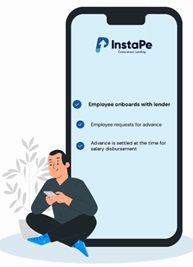Workers in the low wage bracket need a reliable source of emergency funds. Financial support that is quick and accessible, and helps them navigate unforeseen circumstances without resorting to high-interest loans or predatory lending options.
SECURITY TODAY interviewed Mr. Vijay Goel, Co-Founder ofand a senior partner in the law firm, Singhania & Co, working in their London office.
SECURITY TODAY (ST): Welcome, Vijay. Give us a brief background and tell us about the unique initiatives that InstaPe is bringing to the table.
Vijay Goel (VG): Thank you for having me. For many blue-collar workers living on minimum wages, accessing financial support from traditional banks can be challenging. Without a credible credit score, they often find themselves unable to tap into usual fund sources during emergencies, leaving them vulnerable to predatory lenders.
InstaPe was born out of the recognition that blue-collar workers face challenges accessing financial support through traditional means. In the ever-evolving landscape of work, a revolutionary initiative is taking shape, promising a significant shift in how blue-collar workers access financial assistance. InstaPe, with its Conscience Lending approach, isn’t your typical fintech; it’s a cornerstone in empowering the workforce and nurturing financial well-being.
ST: The Earned Wage Access (EWA) program seems like a game-changer. Could you walk us through how it works?
VG: It works in 4 Simple steps.
Agreements: The employer executes two straightforward agreements – a tripartite agreement between the employer, bank, and InstaPe, and an agreement between the employer and InstaPe for information sharing.
Seamless Integration: InstaPe connects its platform to the employer’s HRMS or Time-Attendance Systems to track the days an employee has worked. InstaPe also offers its state-of-the-art biometric time attendance system should the employer need one.
On-Demand Advance: When employees need funds before payday, they request an advance through the InstaPe mobile app. Typically, they can access a percentage of their earned wages, upto a limit set by the employer. The funds are instantly transferred to the employee’s salary bank account. In essence, InstaPe, acting as a B2B2C entity, operates at the employer’s behest, seamlessly integrating into HR initiatives.
 Automatic Deduction: On the regular payday, the employer deducts the advanced amountfrom the employee’s paycheck. This process is automatic and requires no additional action from the employer or employee since the entire journey is digital.
Automatic Deduction: On the regular payday, the employer deducts the advanced amountfrom the employee’s paycheck. This process is automatic and requires no additional action from the employer or employee since the entire journey is digital.
ST: How does InstaPe mitigate risks associated with employees leaving after drawing advances?
VG: Addressing concerns about employees leaving after drawing advances, InstaPe’s Earned Wage Access program ensures that employees can only withdraw funds for the days they have already worked. This proactive approach, aligned with legal obligations, eliminates risks and liabilities for employers. For example, if an employee’s monthly salary is Rs. 30,000 and they’ve worked for 5 days, they can only withdraw Rs. 5,000 or a percentage thereof.
ST: What sets InstaPe apart in the crowded fintech landscape?
VG: Unlike other players, InstaPe has teamed up with a bank to provide as little as Rs. 1,000 at the lowest possible cost in just 30 seconds, with zero transaction and processing costs. For instance, borrowing Rs. 1,000 for 10 days would cost an employee just Rs. 5; lower than what it would cost an employer to process an application requesting an advance.
ST: Looking ahead, you mentioned plans to expand services for blue-collar well-being. Could you share some insights into these upcoming offerings?
VG: Absolutely. InstaPe is committed to the holistic welfare of blue-collar workers. As InstaPe focuses entirely on the well-being of blue-collar workers, it plans to launch not only additional financial products but also ventures into healthcare and insurance. These upcoming offerings are strategically designed to increase employee loyalty and reduce attrition, further solidifying InstaPe’s commitment to the holistic welfare of the blue-collar workforce. InstaPe isn’t just changing how workers access funds; it’s shaping a future where every aspect of their well-being is a top priority.
ST: InstaPe seems to be of immense benefit to the security and facilities management services industry.
VG: Absolutely. It not only enables employers to help their employees with emergency funds anytime, anywhere at the lowest possible cost, we would soon be launching more wellness initiatives like low cost diagnostics, low cost healthcare and insurance soon. We want employees to love the organisation they work for!
ST: Thank you, Vijay, for sharing these insights into InstaPe’s transformative initiatives. It’s clear that InstaPe is not just changing how workers access funds but is actively shaping a future where their overall well-being takes centre stage.
VG: Thank you for having me. InstaPe is indeed dedicated to making a positive impact on the lives of blue-collar workers.
Earned Wage Access (EWA), also known as instant pay, earned income, early wage access, accrued wage access, or on-demand pay, is officially termed as the Employer Salary Advance Scheme by the UK government.
This financial service caters primarily to low-wage and hourly workers, allowing them access to a portion of their accumulated wages before the completion of their regular payroll cycle.
The emergence of Earned Wage Access programs in the 2010s responded to the decreasing accessibility of credit and traditional banking services among Americans. These programs, integrated with payroll systems, aimed to usher in a more equitable and inclusive era of personal finance.
Uber took the initiative in August 2016, partnering with Green Dot to pioneer EWA. This allowed drivers to request their earnings after each trip in exchange for a small fee.
In countries like the UK and India, where the standard pay cycle is monthly rather than bi-weekly, ‘EWA’ holds even greater potential theoretically.
Earned Wage Access is advocated for aligning income with expenses, preventing workers, especially those with lower incomes, from facing cash flow challenges that might lead to high-interest debt. Academic consensus supports this, with research indicating better financial outcomes for EWA users compared to non-users.
A moral argument is presented, asserting that employees are entitled to the pay they have already earned, rather than employers benefiting from the cash flow advantages of paying in arrears.
The scheme suggests benefits for employers, including quicker recruitment, better staff retention, a more motivated workforce, and increased willingness to take on extra shifts. These factors can contribute to a positive work environment.
Positioned as an ethical alternative to payday lenders, Earned Wage Access providers typically charge a modest flat fee instead of interest. Moreover, there are no credit impacts, underwriting processes, or recourse in Earned Wage Access transactions.








